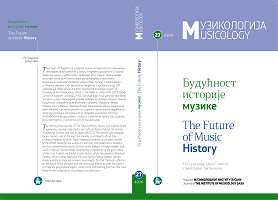Ancient Greek rhythmsin Messiaen’s Le sacre: Nietzsche’s legacy?
Ancient Greek rhythmsin Messiaen’s Le sacre: Nietzsche’s legacy?
Author(s): Wai-Ling CheongSubject(s): Cultural history, Music, Social history, Ancient World
Published by: Muzikološki institut SANU
Keywords: ancient Greek rhythm; Le sacre du printemps; Nietzsche; Fétis; Gevaert; Laloy; Emmanuel; Messiaen;
Summary/Abstract: It is lit le known that Nietzsche – appointed professor of classical philology at Basel University in his twenties – had postulated on the basis of rigorous textual studies that the leading classical philologists active in Central Europe in the nineteenth century, predominantly German-speaking, had gone seriously of -track by ft ing Greek rhythms into measures of equal length. Unlike the philologists, inf uential musicologists who wrote about ancient Greek rhythms were mostly French. The Paris Conservatoire was a powerhouse of rhythmic theory, with an impressive lineage from Fétis and Gevaert through Laloy and Emmanuel to Messiaen and beyond. Fétis and Gevaert referenced their contemporary German philologists without really critiquing them. With Laloy, Emmanuel, and Messiaen, however, there was a notable change of orientation. T ese authors all read as if they had somehow become aware of Nietzsche’s discovery. Yet none of them make any mention of him whatsoever. In this study, a comparative analysis of their musical rendition of Greek rhythms is undertaken before focusing on Messiaen’s analytical proposal that there is an impressively long series of Greek rhythms in Stravinsky’s Le sacre du printemps. I seek to throw light on the resurgence of interest in ancient Greek rhythms in modernist musical works, and question how the convoluted reception of Nietzsche’s discovery in Parisian music circles might have sparked rhythmic innovation to new heights.
Journal: Muzikologija
- Issue Year: 2/2019
- Issue No: 27
- Page Range: 97-136
- Page Count: 40
- Language: English

